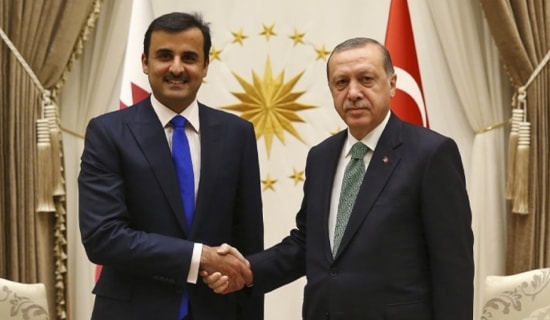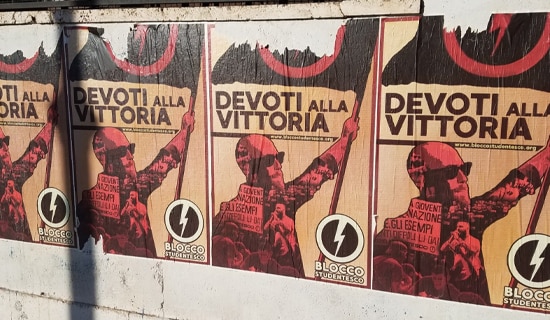The ruling Chinese Communist Party (CCP) last week marked the 70th anniversary of its entry into the Korean War on behalf of North Korean Communists. The occasion led to the release of several films including a live action film starring Wu Jing (the star of the nationalist "Wolf Warrior 2") and an animated war movie "Salute to the Heroes" released on October 23, aimed at showing children "the tenacity and bravery of the Chinese Volunteer Army."[1] Action star Jing is slated to star in still another Korean War epic for 2021 release, on the battle for the Chosin Reservoir – a legendary battle in the annals of the U.S. Marine Corps.[2]

Not surprisingly, entertainment media attention was matched by official pronouncements on the conflict that the CCP calls the "War to Resist U.S. Aggression And Aid Korea." China's President Xi Jinping gave an October 23rd speech touting the victory that "resisted imperialist aggression and expansion, safeguarded the security of New China, safeguarded the peaceful life of the Chinese people, and stabilized the situation on the Korean Peninsula."[3]
China is perhaps the most media savvy and well-financed of various revisionist nationalist powers, but you can find similar media/political mobilization campaigns in places like Erdoğan's Turkey and, to a lesser extent, Putin's Russia.[4] The goal among all these authoritarian regimes is the same, to extol patriotic virtues, especially among young people, and directly or indirectly, build support for the nation state.[5]
If China and Russia highlight nationalist themes, Turkey exalts both nationalism and religion, explicitly embracing both Turkish history and Islam. The conversion of Byzantine churches turned museums under Atatürk into mosques is both a nationalist message and a religious one, a domestic message for Turks and for the West, of conquest and dominance.[6] Under tremendous economic pressures and active on several international fronts, it is no surprise that Turkey has donned the mantle of the Prophet's champion in an aggressive boycott campaign against Emmanuel Macron's France over cartoons of Muhammad. The campaign has been led by Erdoğan and his allies in Doha and among the Muslim Brotherhood but anti-French rhetoric has been broadly popular among conservative Muslims of many stripes, from regime religious figures like Egypt's Ahmed Al-Tayyeb to the global jihadists of ISIS and Al-Qaeda.

Like China's appeal to nationalism and Erdoğan's embrace of the Ottomans, the defense of Islam's prophet is a cause with power to touch men's hearts and stir them to righteous and violent action. These are stances in defense of great themes – "the motherland" or "the Prophet." One Palestinian Al-Aqsa sheikh recently appealed to Ottoman history, calling for caliphal armies to defend the prophet against France.[7] Macron's France counters this worldview, not with a Christianity that is disbelieved by many in the West, but with the slender reed of French laicite and the values of the Republic. In France today, the offspring of Robespierre and of Muhammad, both with a legacy of beheading Christians, struggle to gain the upper hand.[8]
If Chinese, Turks, and Muslims are rising up to burnish and defend those symbols they hold dear, the situation in the West is rather different. The great American political philosopher James Burnham once said that "liberalism is the ideology of Western suicide." While the sacred symbols and national banners rise in the East, in the United States and parts of Western Europe they are coming down, being broken and burnt. While Erdoğan celebrates ancient victories over the Byzantines and the Catholic Holy League and Xi Jinping honors China's Korean War "victory," Americans and Britons demolish their physical heritage with seemingly religious fervor. Columbus, Churchill, Washington, Lincoln, war heroes, Catholic saints and churches there seems little of the Old Order left to venerate or cherish.
And it isn't just statues. Ambitious ideological initiatives like the 1619 Project seek to mainstream a destructive and nihilistic view of American history that was once only the purview of elite academics.[9] Trump's "Make America Great Again" is now challenged on the streets by "America Was Never Great."[10] Western self-hatred has never been so fashionable.
Some might say that the stories China, Turkey, and conservative Islam tell about themselves and the world are completely irrelevant to the way the world works. Certainly, the West should not see the siren song of authoritarians as any sort of model to emulate or respond to in any way. It is also not at all clear how successful these authoritarian, revisionist powers and ideologies will be in the end.

There is a powerful tendency in the West, especially by elites, to see us all as beyond history, and beyond religion, particularly Christianity. In America the rising ideology seems to reside in racial politics, sexual autonomy, and consumerism. Melanin, Eros, and Mammon are the idols of the present age in the United States. It will be interesting to see this modernist worldview develop as it consolidates its dominance. Does it have any sort of compelling answer or counter-narrative to the nationalist or religious discourse of others, especially among non-Westerners? Can it sustain the national political project of the United States of America going forward, providing the meaning and grand story that men crave or is it merely the penultimate stage in "Western suicide?" We will see.
Some critics might say that, faced by the fervent convictions of nationalists and religious chauvinists in other countries (and within), modern Western society offers the convictions of the doughnut hole – a vacuum, because there is nothing really there. The affluent West seems to have chosen the hollow pursuit of worldly happiness over transcendence and expects that this will triumph in the end.
Just days before an American presidential election, the question of a national narrative looms large. The incumbent, to his credit, opposes toxic initiatives like Critical Race Theory. But even his partisans would not see him as much of a uniter and his administration's national narrative does not seem to go much beyond inchoate views of American Greatness. America is great, but this has to be defended and explained convincingly.
The challenger does run as a uniter. But his campaign seems to be strongly supported and staffed by people who see America – the American Project – as seriously flawed, something to be ashamed of rather than celebrate.
Whoever wins will inevitably face the urgent challenge of the rising authoritarian revisionist powers. We are against them but what are we for? Beyond material concerns, what is the American or Western story we tell to ourselves, and to others, and are we, or anyone else, moved or inspired by it?
*Alberto M. Fernandez is Vice President of MEMRI.
[1] Globaltimes.cn/content/1203851.shtml, October 18, 2020.
[2] Usa.chinadaily.com.cn/a/202010/27/WS5f97793fa31024ad0ba812fa.html, October 27, 2020.
[3] Cn.chinadaily.com.cn/a/202010/23/WS5f92dfbda3101e7ce972b0eb.html, accessed October 30, 2020.
[4] Reuters.com/article/us-russia-politics-film/patriotic-war-film-draws-8-million-russians-as-ties-with-west-fray-idUSKCN1PO1VD, January 30, 2019.
[5] See MEMRI Daily Brief No. 235 Chinese And Turkish Wolves On A Propaganda Prowl, October 14, 2020.
[6] Twitter.com/AJArabic/status/1321798948655263744, October 29, 2020.
[7] See MEMRI TV Clip No. 8397 Al-Aqsa Mosque Address By Sheikh Ali Abu Ahmad: Boycotting French Products Is Not The Answer To Macron; We Should Establish A Caliphate, Crush Paris With Our Armies, October 25, 2020.
[8] Catholicarena.com/latest/niceattacks, October 29, 2020.
[9] Theatlantic.com/ideas/archive/2019/12/historians-clash-1619-project/604093, December 23, 2019.
[10] Newsweek.com/dc-protesters-chant-america-was-never-great-they-burn-us-flag-following-trumps-july-4th-1515488, July 5, 2020.




